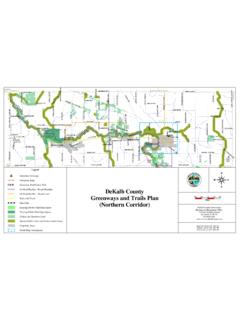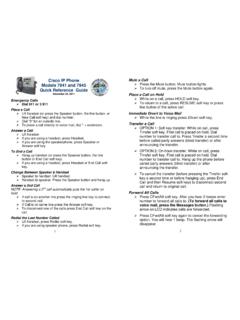Transcription of PTAX-340 2018 Senior Citizens Assessment Freeze
1 PTAX-340 2018 Senior Citizens Assessment FreezeHomestead Exemption Application and Affidavit Last date to apply: August 1, 2018 Part 1: Applicant information (Please type or print.)1 3 First name MI Last name Social Security Number 2 4 Mailing address Date of birth (month, day, year) 5 City State ZIP Area code and phone number Part 2: Property information 1 Street address of property for which this exemption application is filed Township IL City ZIP County 2 Property (parcel) index number (PIN) 3 Have you or your spouse received this exemption for this property previously?If you answered Yes , wr ite the base year, if known. Yes No 4 If your spouse maintains a separate residence, has he or she applied for this exemption?Yes No Part 3: Household income for 2017 - Federal 1040 tax return required for verification You must include the income of you, your spouse, and all other individuals who live in your household.
2 1 Social Security and SSI benefits. Include Medicare deductions in this | 2 Railroad Retirement benefits. Include Medicare deductions in this | 3 Civil Service benefits3 | 4 Annuities, federally taxable pensions and retirement plan distrib | 5 Human Services and other governmental cash public assistance benefits5 | 6 Wages, salarie s, and tips from work6 | 7 Interest and dividends received7 | 8 Net rental, farm, and business income or (loss). (See instructions for Line 8.)8 | 9 Net capital gain or (loss). (See instructions for Line 9.)9 | 10 Other income or (loss). (See instructions for Line 10.)10 | 11 Add Lines 1 through | 12 Certain subtractions. You may subtract only the reported adjustments to income 1040, Line 36, or 1040A, Line 20. Subtraction item Amount 12a 12b | | Add the amounts on Lines 12a and 12b, and write the result. 12 | 13 Subtract Line 12 from Line 11, and write the result.
3 This is your total household incomefor 2017. If the amount is greater than $65,000, STOP. Y ou do not qualify for this | Date received Do not write in this space. Income verified Y es No Application number Base year Revised base year Base year EAV $ Revised base year EAV $ EAV of added improv ements $ Approv ed Yes No Base amount $ PTAX-340 (R-01/18) Complete page 2 and sign form (signature must be notarized) 1 of 4 DEKALB Email Address Part 4: Affidavit Sworn under oath, I state the following: 1 (Mark the statement that applies.)On January 1, 2018 , the property identified in Part 2, Line 1, was improv ed with a permanent structure a that I used as my principal residence. b for which I received this exemption previously and is either unoccupied or used as my spouse s principal residence. I am now a resident of a facility licensed under the Assisted Living and Shared Housing Act, Nursing Home Care Act, ID/DD (intellectually disabled/developmentally disabled) Community Care Act, or Specialized Mental Health Rehabili- tation Act of 2013.
4 Name of facility Mailing address 2 (Mark the statement that applies.)On January 1, 2018 , I a was the owner of record of the property identified in Part 2, Line 1. b had a legal or equitable interest by a written instrument in the property listed in Part 2, Line 1. c had a leasehold interest in the property identified in Part 2, Line 1, that was used as a single-family residence. 3 I am liable for paying real property taxes on the property identified in Part 2, Line : If I have not received this exemption for this property previously, I also met the eligibility requirements listed in Part 4, Lines 1, 2, and 3 for this property on January 1, 2017. 4 (Mark the statement that applies.)a In 2018 , I am, or will be, 65 years of age or older. b In 2018 , my spouse, who died in 2018 , would have been 65 years of age or older. (Complete the following information.) Deceased spouse s name Tax ID number / / / / Date of birth (month, day, year) Date of death (month, day, year) 5 The property identified in Part 2, Line 1, is the only property for which I am applying for a Senior Citizens Assessment freezehomestead exemption for 2018 .
5 6 The amount reported in Part 3, Line 13, of this form includes the income of my spouse and all persons living in my householdand the total household income for 2017 is $65,000 or less. 7 On January 1, 2018 , the following individuals also used the property identified in Part 2, Line 1, for their principal residence. My spouse is included if he or she used the property as his or her principal dwelling place on January 1, 2018 . The total income of all individuals and my spouse (regardless of his or her principal residence) are included in Part 3. (Attach an ad- ditional sheet if necessary .) Fi rst and last name Social Security Number a b 8 (Mark the statement that applies.)On January 1, 2018 , I was a single, widow(er), or divorced. b married and living together. c married, but not living together. My spouse s name and address is __ First name MI Last name ___ Street Address City State ZIP Under penalties of perjury, I state that, to the best of my knowledge, the information contained in this affidavit is true, correct, and complete.
6 / / Signature of applicant Date (month, day, year) Subscribed and sworn to before me this da y of , 20 . Notary public Note: The CCAO may conduct an audit to verify that the taxpayer is eligible to receive this exemption. Mail your completed Form PTAX-340 to: If you have any questions, please call: DeKalb Co. Chief County Assessment Officer 815-895-7120110 E Sycamore Street Sycamore, IL 60178 Last date to apply is August 1, 2018 This form is authorized in accordance with the Illinois Property Tax Code. Disclosure of this information is required. 2 of 4 Failure to provide information may result in this form not being processed and may result in a penalty. PTAX-340 (R-01/18) Form PTAX-340 General Information What is the Senior Citizens Assessment Freeze Homestead Exemption (SCAFHE)? The Senior Citizens Assessment Freeze Homestead Exemption (35 ILCS 200/15-172) allows you, as a qualified Senior citizen, to have your home s equalized assessed value (EAV) frozen at a base year value and prevent or limit any increase due to inflation.
7 The base year generally is the year before the year you first qualify and apply for the exemption. For example, if you first qualify and apply in 2018 , your property s EAV will be frozen at the 2017 EAV. The amount of the exemption is the difference between your base year EAV and your current year EAV. For Cook County only, the amount of the exemption is the difference between your base year EAV and your current year EAV or $2,000 whichever is greater. Freezing your property s EAV does not mean that your property taxes will not increase, however. Other factors also affect your tax bill. For example, y our tax bill could increase if the tax rate, which is based on the amount of revenues taxing districts re- quest, increases. Your EAV and tax bill may also increase if you add improvements to your home. However, if your home s EAV decreases in the future, y ou will benefit from any reduction. Who is eligible?
8 The Senior Citizens Assessment Freeze homestead exemption quali- fications for the 2018 tax year (for the property taxes you will pay in 2019), are listed below. You will be 65 or older during 2018 . Your total household income in 2017 was $65,000 or less. On January 1, 2017, and January 1, 2018 , you used the property as your principal place of residence, owned the property, or had a legal or equitable interest in the property as evidenced by a written instrument, or had a leasehold interest in the property used as a single-family residence, and were liable for the payment of property taxes. You do not qualify for this exemption if your property is assessed under the mobile home privilege tax. Surviving spouse Even if you are not 65 or older during 2018 , you are eligible for this exemption for 2018 (and possibly 2017) if your spouse died in 2018 and would have met all of the qualifications. Residents in a health facility Even if you did not use the property as your principal place of residence on January 1, 2018 , you qualify for this exemption if you are a resident of a facility licensed under the Assisted Living and Shared Housing Act, Nursing Home Care Act, ID/DD (intellectually disabled/ developmentally disabled) Community Care Act, or Specialized Mental Health Rehabilitation Act of 2013 and you meet all other requirements, have received this exemption previously, and your property is either unoccupied or is occupied by your spouse.
9 Residents of cooperatives If you are a resident of a coop- erati ve apartment building or cooperati ve life-care facility, you qualify for this exemption if you are liable for the payment of the property taxes on your residence and meet the other eligibility requirements. What is a household? A household includes you, your spouse, and all other persons who used your residence as a principal dwelling place on January 1, 2018 . What is included in household income? Household income includes your income, your spouse s income, and the income of all individuals living in the household. Examples of income that must be included in your household income are listed below. (For specific questions, see Part 3 on Page 4.) alimony or maintenance received annuities and other pensions Black Lung benefits business income capital gains cash assistance from the Illinois Department of Human Ser- vices and other governmental cash public assistance cash winnings from such sources as raffles and lotteries Civil Service benefits damages awarded in a lawsuit for nonphysical injury or sick- ness (for example, age discrimination or injury to reputation) dividends farm income Illinois Income Tax refund (only if you received Form 1099-G) interest interest received on life insurance policies long term care insurance (federally taxable portion only)
10 Lump sum Social Security payments miscellaneous income, such as from rummage sales, recy- cling aluminum, or baby sitting military retirement pay based on age or length of service monthly insurance benefits pension and IRA benefits (federally taxable portion only) Railroad Retirement benefits (including Medicare deductions) rental income Social Security income (including Medicare deductions) Supplemental Security Income (SSI) benefits all unemployment compensation wages, salaries, and tips from work Workers Compensation Act income Workers Occupational Diseases Act income What is not included in household income? Some examples of income that are not included in household income are listed below. (For specific income questions, see Part 3 on Page 4.) cash gifts child support payments COBRA subsidy payments damages awarded in a lawsuit for a physical personal injury or sickness Energy Assistance payments federal income tax refunds IRA s rolled over into other retirement accounts, unless rolled over into a Roth IRA lump sums from inheritances lump sums from insurance policies money borrowed against a life insurance policy or from any financial institution reverse mortgage payments spousal impoverishment payments stipends from Foster Parent and Foster Grandparent programs Veterans benefits What if I have a net operating loss or capital loss carryover from a previous year?










